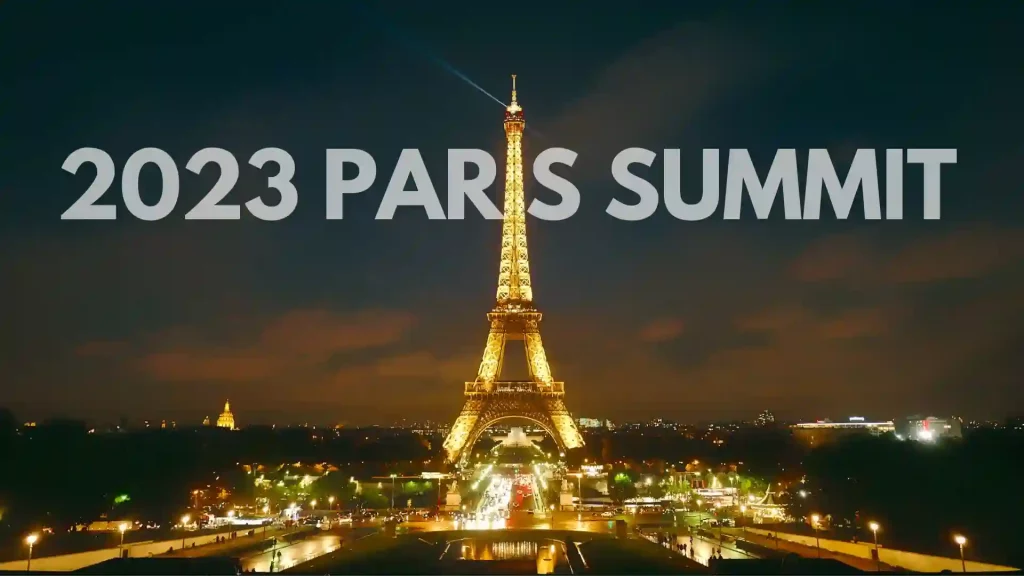Paris is going to host the Summit for a New Global Financing Pact on the 22nd & 23rd of June. It will invite heads of state, financial leaders, and activists from across the world to formulate palms to catch up with the world’s developmental banks like the World Bank and the International Monetary Fund (IMF).
The World Bank and IMF have been blamed for making lending decisions as per the whims of wealthy nations like the United States and also for not considering the climate damage due to their loans. The de facto control of some powerful nations is questioned for the negligence of siding the smaller nations that are most prone to the adversaries of global change from decisions relating to countering global warming.
The fancy Paris summit led by the French President Emmanuel Macron is doubted, as he might not be able to take major decisions to counter significant challenges besides resolving some smaller problems.
Participants of the Paris Summit
The Paris Summit will have substantial participation of leaders from developing nations from Africa and Asia, and elsewhere, giving them an important say on the table. Climate change is the key topic of discussion for the summit, alongside poverty reduction and debt remodelling.
The Paris Summit will have representatives from over 100 countries. It is assumed that heads of state and government of a wide range of countries ranging from Germany to Zambia and Brazil to Senegal.
Climate activists Greta Thunerg and Vanessa Nakate, Barbados Prime Minister Mia Motely, World Bank President Ajay Banga, US Treasury Secretary Janet Yellen, IMF Managing Director Kristalina Georgieva, and Chinese Premier Li Qiangare are some of the attendees of the summit.
Mia Motely, the Barbados Prime Minister, will be responsible as the Bridgetown Initiative’s leader. It is a plan to remodel developmental lending by releasing money after climate disasters. Its main aim is to solve the high borrowing rates and provide some relief to developing nations.
Leaders need to be willing to accept the change and make bigger and stronger decisions, said Masood Ahmed, the Center for Global Development think tank president in Washington. Having served in the IMF and World Bank, the former senior official said it would not be easy to gather the political will to spend taxpayer money on resolving the climate change crisis.
A French government official, who wishes to be anonymous because of the nation’s presidential policy, said that French organisers want to show the world that they can handle resolving poverty and climate change simultaneously.
As per the organising committee, the Paris Summit will close with a set of commitments and will have a list of expectations from the meeting of the UN climate conference and the Group of 20 major economies.
A US Treasury official told a news outlet that big financial commitments must not be expected from this summit. The Paris Summit should be perceived as a platform to push for change in the operations of global developmental banks.
World Bank
The World Bank is, however, stepping aside from the public comments of its former President David Malpass, who stated his doubtfulness about the science of fossil fuel combustion leading to global warming. He was replaced by Ajay Banga. He will be attending his first big international meeting since his promotion.
The World Bank has announced that to tackle poverty and resolve the climate change crisis, it will boost its lending by $50 billion over a decade.
The Problem of Global Banks
The US Secretary of the Treasury, Janet Yellen, has been vocal about including climate change in global finances since 1997 when she was chair of the White House Council of Economic Advisers. She has demanded seats for the lower income countries or the smaller nations that are at the most risk of global warming in the discussions of fighting climate change. She has also been asking for an amendment in the standard of procedure of the global banks.
She said last October that we must aid developing nations in transitioning to a carbon-neutral economy and providing them with access to clean energy sources.
As per Dartmouth climate scientist Justin Mankin, global development banks have a soft corner for the wealthy and industrialised nations while lending for climate change. He says that it will be tough for developing countries to compete with climate change in a world where the richer nations are the largest contributors to global warming and have deep pockets.
The former IMF and World Bank official, Ahmed, has said that such conferences will have to face the brunt of subdivided interests and increasing geopolitical tensions, especially between the United States and China.
